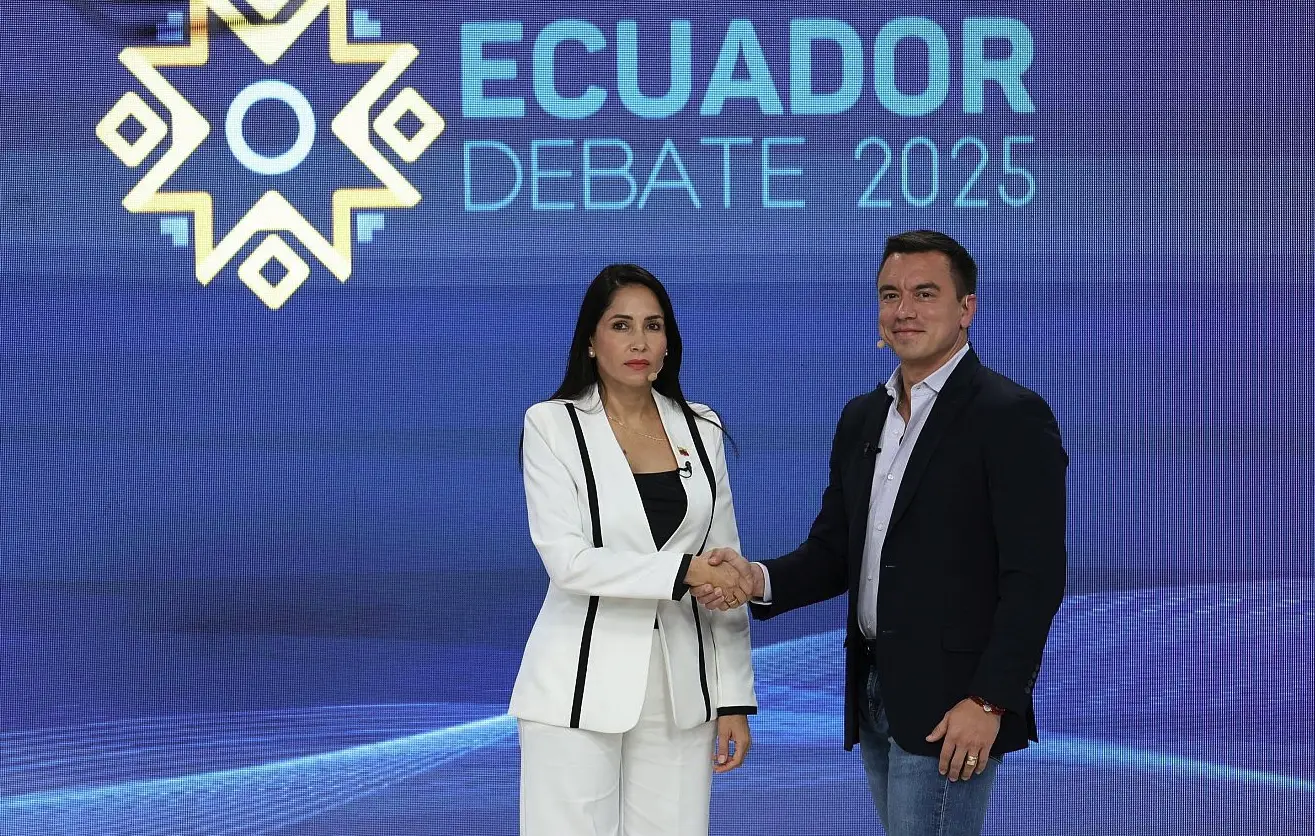The results of Ecuador’s February 9 general elections have revealed deep political divisions. The tight race between incumbent President Daniel Noboa and challenger Luisa González, has set the stage for an intense run-off on April 13. The outcome of the ballot will be crucial for Ecuador’s future as the country struggles to contain escalating gang violence and organized crime amid institutional instability and an increasingly divided electorate.
Political gridlock looms as Ecuador heads to a runoff
Ecuador’s political landscape has been reshaped by the rise of left-leaning Luisa González in the first round of elections. Although some pre-election polls suggested that Daniel Noboa, the right-wing incumbent, looked set to win, the almost even split of nearly 90 percent of the electorate between the two candidates reveals deep polarization. Tensions look set to rise as the newly elected National Assembly reflects this partisan fragmentation, with neither candidate positioned to secure a legislative majority.
So far, Noboa’s administration has sought to consolidate executive power, often bypassing a fragmented legislature through decrees and questionable legal mechanisms. If he continues in office, his efforts to centralize power would likely face significant opposition, and his ability to govern will be further tested. This looming political deadlock, combined with escalating security concerns, could test Ecuador’s governance for years to come.
State struggles to tackle rising gang violence
Less than two years ago, in August 2023, Ecuadorians elected Daniel Noboa to complete the term of then-president Guillermo Lasso, who had dissolved the National Assembly and called for early elections. A deep political crisis between the legislature and the executive, preceded by corruption cases involving high-ranking officials, led to the use of this extraordinary mechanism.
The 2023 election campaign was marred by violence, threats and even the assassination of a presidential candidate. It followed an alarming rise in organized crime and violence over the past few years. The country’s homicide rate rose from 6 per 100,000 in 2018 to a staggering 47 in 2023, fueled by the expansion of transnational organizations, such as drug cartels from Mexico and Albania, and the reorganization of cocaine trafficking routes to Europe. These criminal groups have infiltrated prisons, corrupted courts and co-opted local governments for money laundering, undermining state authority and feeding a cycle of impunity, violence and institutional decay.
This is illustrated by the Bertelsmann Transformation Index (BTI) which in 2024 gave Ecuador a score of 7 out of a possible 10 points, in the state’s monopoly on the use of force, down from 9 points in 2020. This decline reflects weakening state control over security, placing Ecuador below regional peers like Uruguay and Argentina and with an only slightly better score than Colombia and Mexico, both nations with long histories of organized crime.
Noboa’s interim government has responded by deploying military forces to key areas of unrest, issuing emergency decrees and expanding the security apparatus by increasing police and army presence and surveillance measures. The president has also declared an “internal armed conflict” and listed more than 20 criminal gangs as terrorist organizations. However, given the government’s inability to reduce violence and its reliance on emergency measures, indicators of the country’s stateness, or its ability to extend its control throughout its territory, are expected to continue to decline.
While the decision to send in the army to take over the security of prisons and boosting police presence in high-crime areas has shown some short-term success, there have also been concerns about potential human rights violations and undermining democratic control. Critics argue that a militarized response may exacerbate cycles of violence rather than addressing the structural socio-economic factors that foster crime.
The question remains: Can Ecuador’s next government implement a sustainable security strategy that balances law enforcement with institutional reform?
Security stances and policy directions
Whether the country continues to pursue Noboa’s hardline approach or moves towards the community-based crime prevention strategies alternatives proposed by González, will be determined by the April 13 election.
Luisa González, a former legislator for the leftist Citizen Revolution Movement party and the protégé of exiled ex-president Rafael Correa, has campaigned on a platform promising a return to the social policies and economic model of the Correa administration (2007-2017). González pledged to increase subsidies, expand state intervention in the economy and address the root causes of violence through social investment, while reassessing Ecuador’s security strategy by restoring Correa-era institutions such as community assemblies for citizen security to coordinate and oversee police action. However, when it comes to addressing the challenges of organized crime, her proposals are low on detail. This has sparked various interpretations and criticisms, with some linking her candidacy to the authoritarian legacy of her party’s leader and the possible return of “Correismo” to power and its control over the independent branches of government.
What will happen after Ecuador’s runoff?
The security crisis and subsequent state response have rattled the country’s already sluggish economy, with foreign investment and employment falling to worrying levels. This deterioration has exacerbated the country’s social problems.
If Noboa stays in power, his administration is likely to continue its militarized approach to security while pursuing economic reforms. However, his plan to woo foreign capital may prove difficult amid growing concerns over democratic backsliding, institutional constraints and the government’s inability to rein back organized crime. Alternatively, a victory for González would likely mean a shift towards increased social spending, a reassessment of security policy, and emphasis on state-led development. Her administration would also face challenges in implementing reforms due to strong opposition in the legislature and the continued influence of entrenched criminal networks.
Regardless of the outcome, Ecuador’s next leader will have to address economic stagnation, rising public debt and deeply divided political environment. The new government will face pressure to restore public confidence and curb organized crime, while strengthening democratic institutions, fostering political cohesion and securing international cooperation to ensure long-term stability. Choices made in the coming months will determine whether Ecuador moves towards a more cohesive governance model or continues to be beset with internal divisions.













